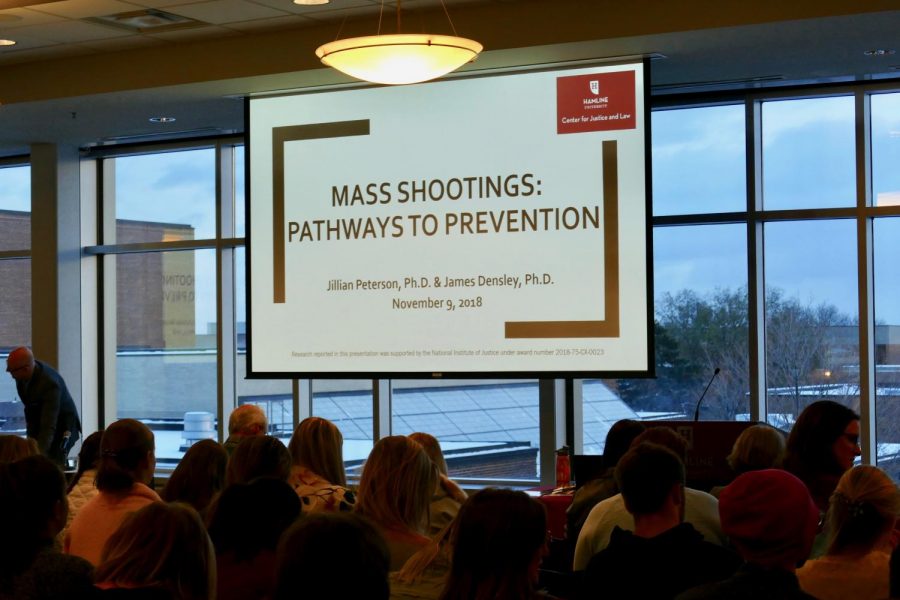Hamline faculty funded for mass shootings research
Criminal Justice professor awarded a federal grant to create the first database on public mass shooters.
Hamline’s Center for Justice and Law hosts presentation on the findings of a mass shooter database project.
November 16, 2018
Jillian Peterson, an assistant professor of Criminal Justice, received a $300,000 grant from the U.S. Department of Justice this past month to fund two years of research on mass shootings.
The grant is one of three the Department of Justice has provided to study mass shootings.
“This is a relatively new crime,” Peterson said. “Mass shooters tend to be different and no one really understands why people are doing this, and so I really wanted to try and figure that out.”
Peterson’s research, which she says is the first of its kind to take such a close look at mass shootings, is influenced by her background and experience in criminal psychology.
“I feel like people do horrible things because they’ve been through horrible things,” Peterson said. “Not that that excuses it, but if you want to talk about actual prevention, you have to really understand the story of how someone gets to that point.”
Peterson, who is also the director of the Center for Justice and Law, has partnered for this research with James Densley, a sociologist and professor at Metropolitan State University.
With the help of volunteer teams of students from Hamline and Metropolitan State University, they spent nine months combing through public information to compile data on every mass shooter since 1996, for a total of 158. Seven of those shootings were from this year.
With the individual shooter database complete, the grant will allow Peterson to broaden the research.
She plans to create a second database analyzing community-level risk factors conducive to mass shootings, including race, poverty, the availability of mental health resources and gun ownership rates. Additionally, Peterson and Densley will conduct interviews to supplement their data collection.
So far they’ve received agreements from five surviving incarcerated mass shooters to conduct interviews in connection to the project. The interviews will be conducted over the summer and provide personal testimonies from shooters about their circumstances before the shootings.
“We’re not interested in the shooting, we’re interested in their lives leading up to the shooting,” Peterson said.
Peterson and Densley will follow those with other interviews in corresponding communities during the fall.
“We’ll be talking to family, friends, people who knew them. We also want to get the perspective of the people who were at the shooting if we can talk to victims or people who were there that day,” Peterson said.
Two Hamline students will be funded to join them for each of these community interviews. Other Hamline students will continue to be involved in building the databases.
Although the existing shooter database will not become public until 2020, Peterson said they have drawn some preliminary conclusions from the data collected. These were unveiled during a public presentation on Nov. 9 at Klas Center.
Coming in the wake of the recent California shooting, Peterson said the biggest discovery they’ve made is the lack of data clusters.
“There is no groupings or typologies or profiles,” Peterson said. “We couldn’t find anything statistically. It was all over the place. Everybody had a really individual story.”
Peterson pointed to the urgency of understanding more about the spread of that data and continuing this research, particularly in light of recent shootings.
“This is a sort of area we really don’t understand yet as a field, which makes it exciting,” Peterson said. “It’s also one that we desperately need to understand.”


